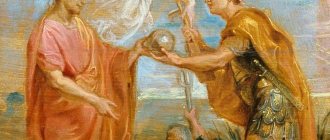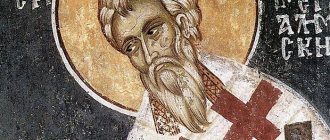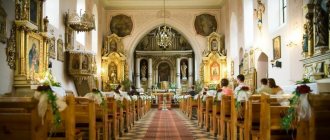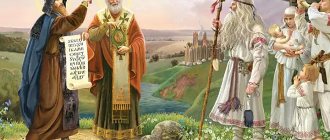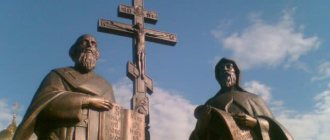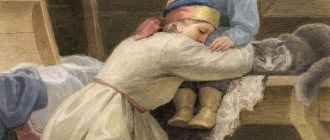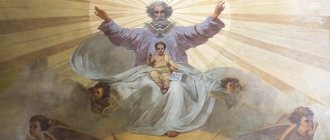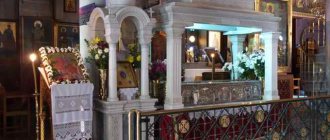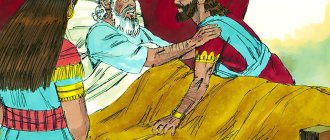| Saint Equal to the Apostles Cyril, Slovenian teacher |
Cyril the Philosopher
(before adopting the schema - Constantine) (+ 869), Slavic first teacher, Equal-to-the-Apostles saint. Together with his older brother, St. Methodius, created the Slavic alphabet and became the first translators of liturgical books into the Slavic language Memory of February 14, May 11, among the Seventh Day, in the Councils of the Bulgarian, Galician and Carpatho-Russian saints
St. Cyril was born in 826 - 827 in the city of Thessaloniki in Macedonia in the family of Leo Drungaria, a Bulgarian Slav by birth, one of the assistants to the Thessalonica strateg (military governor-general).
He received an excellent education, growing up with the emperor's son from the age of 14. He perfectly comprehended all the sciences of his time and many languages, he especially diligently studied the works of St. Gregory the Theologian, for which he received the nickname Philosopher (wise) (according to other sources, he received this nickname later as a teacher of philosophy).
Cyril, who had access to the court of Empress Theodora, after refusing a profitable marriage, accepted the priesthood and was appointed keeper of the patriarchal library at the Church of St. Sophia. But, neglecting all the benefits of his position, he retired to one of the monasteries near the Black Sea.
Almost forcibly, he was returned to Constantinople and appointed teacher of philosophy at the Magnavra Academy. The closeness with Photius (the future patriarch) affected Cyril’s struggle with the iconoclasts; he participated in the embassy of Photius to the Arabs of the Baghdad Caliphate, on the occasion of the exchange of prisoners, and was an excellent polemicist with Muslim learned theologians. The wisdom and strength of faith of the still very young Constantine were so great that he managed to defeat the leader of the iconoclast heretics, Aninius, in a debate.
Seeking solitude, he retired to Mount Olympus [1] to his older brother Methodius, where he first began to study the Slavic language [2], but his solitude did not last long. When Photius became patriarch in 858, Cyril, probably at his initiative, became the head of the mission to the Khazars (860 or 861), where Methodius also went. On the way, during a stop in Chersonese (Korsun) Tauride Crimea. The holy brothers learned that the relics of the Hieromartyr Clement, Pope of Rome, were in the sea, and miraculously found them. The brothers took part of the relics to Constantinople. The three Greek works written by Cyril on this occasion - History, Eulogy and Hymn - have not been preserved: a compilation of them in a poor Church Slavonic translation has reached us under the title: “The Oration on the Transfer of the Relics of the Glorious Clement.”
There, in Korsun, Saint Constantine found the Gospel and the Psalter, written in “Russian letters,” and a man speaking Russian, and began to learn from this man to read and speak his language.
| Saint Equal to the Apostles Cyril, Slovenian teacher |
The brothers' journey into the depths of Khazaria was filled with Cyril's theological disputes with the Mohammedans and Jews (the presentation of the debate made by Cyril in Greek, translated by Methodius into Slavic, has not reached us, except as if extracted from it in the Pannonian Life of Cyril).
Arriving at the Khozars, the holy brothers talked with them about the Christian faith. Convinced by the preaching of Saint Cyril, the Khozar prince and with him all the people accepted Christianity. The grateful prince wanted to reward the preachers with rich gifts, but they refused this and asked the prince to release all the Greek captives with them to their homeland. After the journey, Methodius retired to the Polychronium monastery (near the city of Cyzicus, on the Asia Minor coast); Cyril, in the quiet of his refuge at one of the churches of Constantinople, was probably busy completing work in connection with his not new plans for the conversion of the pagan Slavs, numerous on the Balkan Peninsula.
With the help of his brother Saint Methodius and his disciples Gorazd, Clement, Savva, Naum and Angelyar, he compiled a special alphabet for the Slavic language, the so-called Glagolitic [3], and began translating the Holy Scriptures into Old Bulgarian. Some chroniclers report that the first words written in the Slavic language were the words of the Apostle Evangelist John: “In the beginning was the Word, and the Word was to God, and God was the Word.” This was in 963. The Gospel, the Apostle, the Psalter and some liturgical books were translated.
Awareness of the existence of worship in the popular (not Greek or Latin) language among the peoples of the East (Iberians of the Caucasus, Armenians, Syrians, Copts, Crimean Goths) inspired Kirill with the idea of using the Church Slavonic language in worship. Cyril, together with Methodius, was destined to realize this idea on the soil not of Bulgaria, but of Moravia, which was already considered Christian, but was churchly unorganized, was the subject of the claims of the Bavarian-German episcopate and, at the same time, was fighting for its political independence against Louis the German.
Whether at the initiative of the Moravian prince Rostislav, who was looking for Slavic preachers, or at the initiative of Byzantium, or on their own initiative, but with the support of both the secular and spiritual Byzantine authorities, Cyril and Methodius went to Moravia in 863. They worked here for more than 3 years; converted pagans, confirmed the faith and morality of already believers, taught Slavic literacy, translated liturgical parts of the Holy Scriptures and the most important church rites, and with all this, and especially with their Slavic church service, they aroused the displeasure of the Latin-German clergy, which was all the more dangerous for Moravia because Louis II of Germany renewed the war against her. The brothers decided to return to their homeland and - to consolidate their business in Moravia - take with them some of the Moravian students for initiation into hierarchical ranks.
On the way, which lay through Bulgaria, the brothers stayed for several months in the Blatensky, or Pannonian (southwest of Hungary), principality of Kotsela, where, despite its ecclesiastical (from Salzburg) and political (from Germany) dependence, they did the same, as in Moravia. The delay at Kotzel and then the stay in Venice are probably explained by the unexpected closure of the route through Bulgaria, which at the end of 866 removed its Greco-Byzantine hierarchy and called in a new Latin one from Rome. In Venice, amid disputes with the Latin clergy over the “trilingual heresy”, from the point of view of which only Greek, Latin and Hebrew were acceptable for worship (and not just for preaching the faith), the brothers at the end of 867 received news from Constantinople about the murder of Emperor Michael and the deposition of Photius, who had previously been cursed by Pope Nicholas I. The humility of the new Byzantine authorities before Rome and the possible dangers from them at home prompted the brothers to head to Rome, where, it seems, the pope himself called them.
Arriving in Rome in early 868, Cyril and Methodius found a new pope here, Adrian II. Rome solemnly greeted the brothers and the shrine they brought, part of the remains of Pope Clement. Adrian II approved not only the Slavic translation of the Holy Scriptures, but also the Slavic worship, consecrating the Slavic books brought by the brothers, allowing the Slavs to perform services in a number of Roman churches, and ordaining Methodius and his three disciples as priests. The influential prelates of Rome also reacted favorably to the brothers and their cause. Nevertheless, living in Rome for more than a year, the brothers experienced a lot of moral suffering in Rome: they saw the humiliating behavior of ambassadors from Byzantium, who dishonored the honor of Photius, and learned the terrible, criminal morals of the leading people of Rome.
Cyril, who was in poor health, fell ill and, having accepted the schema, died in 869 at the age of 42, having made a promise from Methodius before his death to continue the work begun in Moravia. Contrary to Cyril’s wishes and his mother’s will, Methodius was forced to abandon his intention to take his brother’s ashes home and agreed to bury him in the Basilica of St. Clement.
| Equal App. Methodius and Cyril. Mosaic |
Biography of a holy teacher
The Equal-to-the-Apostles first teacher and educator was born presumably in the 9th century, in the noble Greek family of the commander Drungaria in Thessaloniki, Macedonia. There were seven brothers in the family, the eldest of whom was Methodius. Before taking monastic vows, Cyril bore the name Constantine. When he was only 12 years old, he was left without parents, but was taken under the tutelage of the pious logothete Theoklistos. Later, a marriage was planned with the goddaughter of the guardian, which did not take place due to Konstantin’s refusal.
Brief life of the holy Equal-to-the-Apostles
The educator began learning to read and write from the age of seven, showing remarkable abilities in science and languages. Coming from a noble family, the boy had the opportunity to study at court with the best teachers along with the minor Emperor Michael. Among his teachers was Photius, the future Patriarch of Constantinople.
For his unique abilities and outstanding knowledge, including in the field of theology, Constantine received the nickname Philosopher (wise). Further, Konstantin could have chosen a professional path that he did not want. He was even offered an honorary position as a reader and library keeper in the Cathedral of St. Sofia. But he chose to leave the capital and go to the monastery. He was soon found and returned to Constantinople, where he was appointed teacher of philosophy in a higher school.
Young Konstantin was responsible for a number of achievements in the field of the Christian faith. Thus, he defeated the leader of the heretics Annius in a debate, debated with Jews and Muslims about the Holy Trinity, and preached to the Khazars. Together with brother Methodius, they discovered the relics of the holy martyr Clement in Korsun, which were later delivered to Constantinople.
Before taking monastic vows, Cyril bore the name Konstantin
It is interesting that in Korsun the enlightener discovered the Gospel and the Psalter written in “Russian letters” and began to learn this language. It was the knowledge of the Slavic language that later helped Constantine in Moravia, where the brothers were sent to learn to worship in the Slavic language. Before this, services were conducted in Latin, which is why dissatisfied German priests complained about the brothers to the Pope. But Pope Andrian, having learned that the brothers had found and were bringing him the relics of Clement, met them with great honors, approved divine services in the Slavic language, and even left books translated by Constantine and Methodius in the library. It was Constantine and his disciples who translated almost the entire Old Testament into Slavic.
In Rome, the enlightener fell ill and was informed by the Lord through a vision of his imminent death. Therefore, he accepted the schema and received the name Cyril, by which he is known and revered today. Before his death, the saint bequeathed to his brother to continue his educational work. By order of the Pope, Cyril’s relics remained in Rome, despite Methodius’ requests for permission to bury his brother in his homeland.
Education
After graduating from eight years of school, Vladimir did not continue his school education. He decided to live an independent life, without burdening his needy parents, who still had his younger sister in their care. Having settled into the “evening”, in 1962 Vladimir began working as a cartographer in the Leningrad complex geological expedition.
Young Vladimir Gundyaev worked on a geological expedition
In 1965, Gundyaev entered the Leningrad Theological Seminary, and in 1967 continued his studies at the Theological Academy. According to information found in some sources, he completed the program in an accelerated mode at the request of Metropolitan Nikodim Rotov, whose cell attendant (i.e. secretary) Vladimir became later, in 1970.
The role of Saint Cyril in Christianity
The role of the first teacher in the development of Christianity is difficult to overestimate. It was he who was involved in numerous translations of theological books into the Slavic language, including the Bible, taught worship and compiled the Slavic alphabet. He not only spread Christianity through the translation of books, but also traveled a lot and preached among followers of other faiths.
Absolutely any believer can make requests to the saint. But it is believed that Cyril patronizes people who have chosen their path of knowledge: teachers, scientists, students, students and even politicians.
The First Teacher helps the worshiper in the following matters:
- facilitating learning and providing successful results;
- assistance in acquiring new knowledge;
- requests for the health of a child bearing a similar name;
- protection from troubles in the home;
- victory over fears;
- protection from enemies and ill-wishers;
- purification of the soul;
- knowledge of life's purpose.
Social activity
In the 90s, Patriarch Kirill became increasingly involved in public activities.
In 1994, the television program “The Word of the Shepherd” was released with his participation, which covered spiritual and educational issues in a language understandable to the common viewer. Exclusive interview. Patriarch Kirill
At the same time, Kirill, as chairman of the Department of External Relations of the Russian Orthodox Church MP, organized work on the creation of the concept of the Russian Orthodox Church in the field of church-state relations. The result of his work was the “Fundamentals of the Social Concept of the Russian Orthodox Church” adopted in 2000 at the bishops’ council - a document outlining the official position of the Orthodox Church in interaction with the state.
In the photo: Patriarch Alexy II and Metropolitan Kirill
Since 1995, the fruitful work of Patriarch Kirill began together with the Government of the Russian Federation. He was repeatedly a member of various advisory bodies, took part in resolving issues related to the Chechen Republic during military campaigns; was involved in organizing various cultural events: celebrating the 2000th anniversary of Christianity, holding the Year of the Russian Federation in a number of countries.
Before his enthronement, Metropolitan Kirill was active in public work
Veneration of Equal-to-the-Apostles Cyril
The holy enlightener is revered not only through prayers and solemn liturgies on Memorial Day. But also the correct perception of icons. The attitude towards the depicted holy face should not be the same as towards an object that is used from time to time when necessary. The holy image requires reverent respect and veneration. First, you need to study the life and features of the archetype’s activities in order to understand the inner world of the saint and get closer to him. You also need to monitor the condition of the image; it should not gather dust on a shelf or stand abandoned. He needs to be given a place of honor in the house.
Cyril and Methodius - the pioneers of Rus'
Memorial Days
Saint Cyril is commemorated on May 24 and February 27. In the Cathedral of Volyn Saints, the funeral liturgy is also celebrated on October 23.
Features of iconography
On icons, Equal to the Apostles Cyril is often depicted with his brother Methodius. It is very rare to find a single image of an educator. Most of the images date back to the 19th century. The oldest of them is located in Talitsa, in the Church of St. Basil the Great.
Images of the first teacher differ depending on the region where the icon was painted and the school of icon painting.
There are also many samples of painting icons, but it is believed that only a prayed and consecrated icon can manifest miraculous properties.
Solo image of the enlightener
Equal to the Apostles Cyril and Methodius are depicted together
Most of the images date back to the 19th century
Khazar mission
In 860, Constantine was sent for missionary purposes to the court of the Khazar Khagan. According to the life, the embassy was sent in response to a request from the Kagan, who promised, if he was convinced, to convert to Christianity. The Khazar Khaganate (Khazaria) is a medieval state created by the nomadic Turkic people - the Khazars. He controlled the territory of the Ciscaucasia, the Lower and Middle Volga regions, modern northwestern Kazakhstan, the Azov region, the eastern part of Crimea, as well as the steppes and forest-steppes of Eastern Europe up to the Dnieper. The center of the state was initially located in the coastal part of modern Dagestan, and later moved to the lower reaches of the Volga. Part of the ruling elite converted to Judaism. Part of the East Slavic tribal unions were politically dependent on the Khazars. The fall of the Kaganate is associated with the military campaigns of the Old Russian state.
During his stay in Korsun, Konstantin, in preparation for polemics, studied the Hebrew language, the Samaritan letter, and along with them some “Russian” letter and language (they believe that there is a typo in the life and instead of “Russian” letters one should read “Sursky”, that is, Syriac - Aramaic; in any case, this is not the Old Russian language, which in those days was not distinguished from Common Slavic). Constantine's dispute with a Muslim imam and a Jewish rabbi, which took place in the presence of the Kagan, ended in the victory of Constantine, but the Kagan did not change his faith.
Prayer to Saint Cyril Equal to the Apostles
About the glorification of the language of the Slovenian teachers and educators, the saints equal to the apostles Cyril and Methodius! To you, as children of your father, enlightened by the light of your teachings and writings and to the faith of Christ, we now earnestly resort to you and pray in contrition of our hearts. If also your covenant, as disobedient children, was not kept, and about pleasing God, as if you had purified it, carelessly, and from like-mindedness and love, even in words, as to brothers in faith and in the flesh, you bequeath goodness, to the fallen: both, as in ancient times In your life, you do not turn away the ungrateful and unworthy, but reward evil for evil, so now you do not turn away your sinful and unworthy children from your prayers, but as those who have great boldness towards the Lord, diligently pray to Him, that He may instruct and turn us to the path of salvation, while discord and may the discords that arise among the brothers of the same faith be pacified, those falling away again brought into unanimity, and unite us all with unity of spirit and love in the one, holy, catholic and apostolic Church: we know, we know that the prayer of the righteous can do much to the mercy of the Lord, even and about sinful people it is offered: do not forsake us, your sad and unworthy children (names), for whose sin your flock, gathered by you, is divided by enmity and seduced by temptations from the Gentiles, has diminished, and its Slovenian sheep, scattered from mental wolves, admire: Give us, through your prayers, zeal for Orthodoxy, so that we are kindled by it, we will preserve the traditions of our fathers well, we will faithfully observe the statutes and customs of the church, we will run away from all strange false teachings, and so we will prosper in a life pleasing to God on earth, we will be worthy of heavenly life in heaven, and there with Together we will glorify the Lord of all, in the Trinity, one God, forever and ever. Amen.
The Equal-to-the-Apostles educator devoted his entire life to the opportunity to accept the knowledge left by previous generations through translations and sermons. That is why his works should not remain in vain and be forgotten in the modern world.
If you find an error, please select a piece of text and press Ctrl+Enter.

